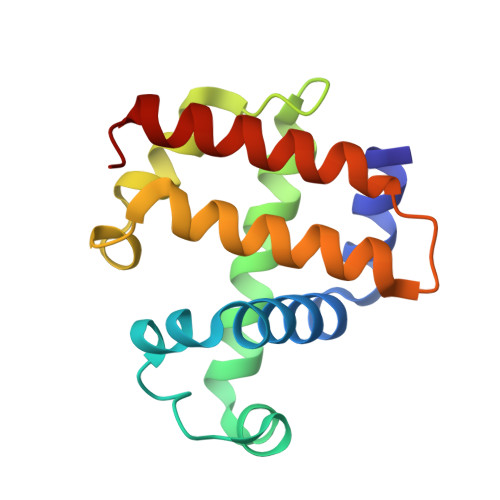Comparative study of the binding and activation of 2,4-dichlorophenol by dehaloperoxidase A and B.
Aktar, M.S., de Serrano, V., Ghiladi, R., Franzen, S.(2023) J Inorg Biochem 247: 112332-112332
- PubMed: 37480762
- DOI: https://doi.org/10.1016/j.jinorgbio.2023.112332
- Primary Citation of Related Structures:
8EJN - PubMed Abstract:
The dehaloperoxidase-hemoglobin (DHP), first isolated from the coelom of a marine terebellid polychaete, Amphitrite ornata, is an example of a multi-functional heme enzyme. Long known for its reversible oxygen (O 2 ) binding, further studies have established DHP activity as a peroxidase, oxidase, oxygenase, and peroxygenase. The specific reactivity depends on substrate binding at various internal and external binding sites. This study focuses on comparison of the binding and reactivity of the substrate 2,4-dichlorophenol (DCP) in the isoforms DHPA and B. There is strong interest in the degradation of DCP because of its wide use in the chemical industry, presence in waste streams, and particular reactivity to form dioxins, some of the most toxic compounds known. The catalytic efficiency is 3.5 times higher for DCP oxidation in DHPB than DHPA by a peroxidase mechanism. However, DHPA and B both show self-inhibition even at modest concentrations of DCP. This phenomenon is analogous to the self-inhibition of 2,4,6-trichlorophenol (TCP) at higher concentration. The activation energies of the electron transfer steps in DCP in DHPA and DHPB are 19.3 ± 2.5 and 24.3 ± 3.2 kJ/mol, respectively, compared to 37.2 ± 6.5 kJ/mol in horseradish peroxidase (HRP), which may be a result of the more facile electron transfer of an internally bound substrate in DHPA. The x-ray crystal structure of DHPA bound with DCP determined at 1.48 Å resolution, shows tight substrate binding inside the heme pocket of DHPA (PDB 8EJN). This research contributes to the studies of DHP as a naturally occurring bioremediation enzyme capable of oxidizing a wide range of environmental pollutants.
Organizational Affiliation:
Department of Chemistry, North Carolina State University, Raleigh, NC 27695, United States of America.



















